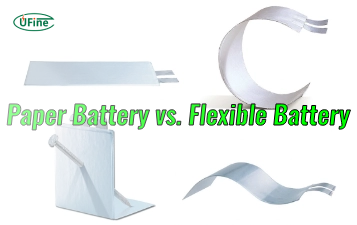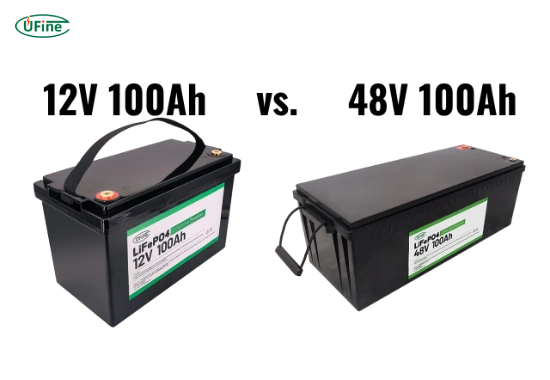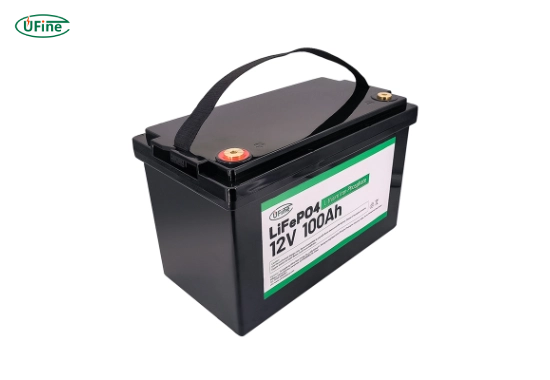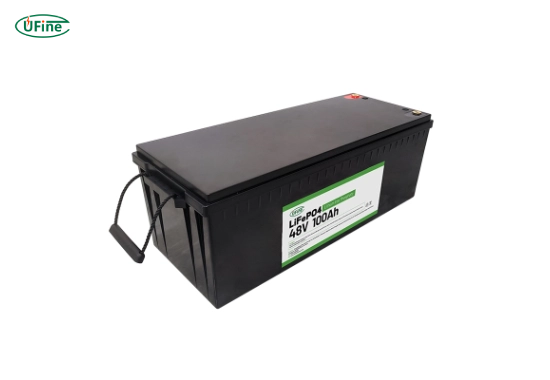When selecting a battery for your power needs, understanding the differences between 12V 100Ah and 48V 100Ah batteries is essential. These two types of batteries serve different applications and have distinct characteristics that can significantly impact performance, efficiency, and cost. This article will delve into the specifications, advantages, disadvantages, and key differences between these batteries, helping you make an informed choice tailored to your requirements.
Part 1. Understanding battery basics
A battery is a device that stores electrical energy through electrochemical processes. It consists of one or more cells that convert chemical energy into electrical energy. Batteries come in various voltages and capacities, making them suitable for multiple applications—from powering small devices to large industrial systems.
How does the voltage of a battery affect its performance?
The voltage of a battery directly influences its performance in several ways:
Power Delivery
Higher voltage batteries can deliver more power without needing multiple units connected in series or parallel. This is particularly important for high-demand applications like electric vehicles or large solar setups.
Energy Loss
Energy loss can occur in lower-voltage systems due to heat generated during power delivery. Higher-voltage systems tend to have lower resistance losses, making them more efficient overall.
Application Suitability
Certain applications require specific voltage levels to function correctly. For instance, many electric vehicles are designed to operate at higher voltages (like 48V) to maximize efficiency and performance.
Part 2. What are the specifications of 12V 100Ah and 48V 100Ah batteries?
12V 100Ah Battery Specifications:
- Voltage: 12 volts
- Capacity: 100 amp-hours (Ah)
- Size: Typically smaller and lighter than higher voltage batteries
- Weight: Generally weighs between 25-30 kg
- Applications: Commonly used in RVs, boats, solar systems, and backup power supplies
48V 100Ah Battery Specifications:
- Voltage: 48 volts
- Capacity: 100 amp-hours (Ah)
- Size: Larger and heavier compared to 12V batteries
- Weight: Usually weighs around 40-50 kg
- Applications: Ideal for larger systems like electric vehicles, grid-tied solar systems, and industrial applications
Part 3. What are the key differences between 12V 100Ah and 48V 100Ah batteries?
Understanding the key differences between these two battery types can help you choose the right one for your needs:
Voltage and Power Output
The most significant difference lies in their voltage levels. A 12V battery provides lower power output than a 48V battery. A higher-voltage battery can deliver more power for high-demand applications without requiring multiple units.
Size and Weight
A 12V battery is generally smaller and lighter than a 48V battery, making it easier to install in tight spaces. This compactness benefits applications like RVs or boats where space is limited.
Efficiency
Higher voltage systems are more efficient for larger applications. A 48V battery can handle larger loads with less energy loss than multiple connected 12V batteries, which may introduce inefficiencies.
Cost
Typically, a 12V battery is less expensive upfront than a 48V battery. However, considering long-term efficiency and performance for large systems may make the higher initial investment in a 48V battery worthwhile.
| Feature | 12V 100Ah Battery | 48V 100Ah Battery |
|---|---|---|
| Voltage | 12 volts | 48 volts |
| Capacity | 100 amp-hours | 100 amp-hours |
| Size | Smaller | Larger |
| Weight | 25-30 kg | 40-50 kg |
| Power Output | Lower | Higher |
| Efficiency | Less efficient for large loads | More efficient for large loads |
| Cost | Generally lower | Generally higher |
Part 4. What are the advantages of a 12V 100Ah battery?
Choosing a 12V 100Ah battery comes with several benefits:
- Versatility: These batteries are widely used in various applications, making them easy to find and replace.
- Compact Size: Their smaller size allows for easier installation in tight spaces.
- Lower Cost: Generally more affordable than higher voltage options.
- Simplicity in Wiring: Easier to wire in series or parallel configurations for specific applications.
Part 5. What are the disadvantages of a 12V 100Ah battery?
While there are many advantages, there are also some drawbacks:
- Limited Power Output: Lower voltage means less power output than higher voltage batteries.
- Inefficiency in Larger Systems: Multiple batteries may be needed for larger setups, requiring more energy-complicating installation.
Part 6. What are the advantages of a 48V 100Ah battery?
The 48V 100Ah battery also has its own set of advantages:
- Higher Efficiency: More efficient for more extensive power requirements; fewer batteries needed for high-capacity systems.
- Better Performance for Electric Vehicles: Ideal for electric vehicles due to their higher power output.
- Longer Lifespan: Often designed for deeper discharges and longer cycles.
Part 7. What are the disadvantages of a 48V 100Ah battery?
However, there are some downsides to consider:
- Higher Cost: Generally more expensive than lower voltage options.
- Larger Size and Weight: It can be cumbersome to install in smaller spaces.
- Complex Wiring Requirements: Wiring setup is more complicated than that of lower voltage batteries.
Part 8. How do I choose between a 12V and a 48V battery?
Choosing between a 12V and a 48V battery largely depends on your specific needs:
- Assess your power requirements: A 12V battery may suffice for devices like lights or small appliances that need less power. For larger systems requiring significant power output, consider a 48V option.
- Evaluate space constraints: A smaller, lighter 12V battery might be more suitable if installation space is limited.
- Consider your budget: If cost is a significant factor, weigh the initial investment against long-term efficiency gains when using a higher voltage system.
Part 9. How do maintenance requirements differ between the two?
Both types of batteries require regular maintenance but differ in complexity:
Maintenance for a 12V Battery:
- Regularly check water levels (for flooded lead-acid types).
- Clean terminals to prevent corrosion.
- Monitor voltage levels to ensure optimal performance.
Maintenance for a 48V Battery:
- More complex maintenance due to multiple cells.
- Requires careful monitoring of individual cell voltages.
- Regularly check connections and wiring integrity.
Part 10. FAQs
-
What is the lifespan of a typical battery?
Lead-acid batteries have a lifespan varying based on type and usage but generally range from three to ten years. -
Can I use a solar panel with both types of batteries?
Yes, both types can be used with solar panels; however, ensure compatibility with your charge controller. -
How do I know when my battery needs replacing?
Signs include reduced performance, inability to hold a charge, or physical damage like swelling or leakage. -
Are there any safety concerns with using these batteries?
Yes, both types can pose risks, such as overheating or leakage, if not appropriately maintained; always follow safety guidelines during installation and use. -
Can I connect multiple batteries?
Yes, you can connect multiple batteries in series or parallel configurations; however, for optimal performance, ensure they are of the same type and capacity.
Related Tags:
More Articles

Paper Battery vs. Flexible Battery: What’s the Difference and Which Is Better?
Paper vs. flexible batteries: learn the key differences, benefits, and which power source fits best for wearables, sensors, and smart tech.
What to Know Before Buying a Tiny LiPo Battery for Your Project
Tiny LiPo batteries are powerful and compact. Learn how to choose the right one for your project with specs, safety, and charging tips.
Bloated LiPo Battery: Will It Explode?
Will a bloated LiPo battery explode? Discover the causes, risks, safety steps, and expert tips to avoid disaster and protect your gear. Must-read safety guide!
12V 100Ah Lithium Ion Battery Price: Full Guide
Learn about 12V 100Ah lithium-ion battery price, from cost ranges to best brands, hidden fees, and how to get the best deal. A must-read for smart buyers!
Resistance and Conductivity: What It Means for Your Lithium Batteries
Resistance and conductivity impact lithium battery performance, lifespan, and safety—learn how they work and why they matter.






